How I became a developer at ABBYY
 On this wonderful 256th day of the year, we congratulate all those involved in the Programmer's Day! And not only those who work in the specialty, but also all those who are interested in programming. According to researchers from Evans Data Corporation, there are 23 million developers in the world. And, probably, it does not matter at all whether it is a lot or a little,
On this wonderful 256th day of the year, we congratulate all those involved in the Programmer's Day! And not only those who work in the specialty, but also all those who are interested in programming. According to researchers from Evans Data Corporation, there are 23 million developers in the world. And, probably, it does not matter at all whether it is a lot or a little, We wish all developers significant and interesting projects, more good code, successful releases and grateful clients, and, of course, to celebrate your Day well by having a fun holiday! And on this occasion, our developers tell us how their working day goes in ABBYY, what projects they do and what they like to do. Welcome under the cut!
Ilya Bulgakov, Head of the Ontological Information Extraction Group
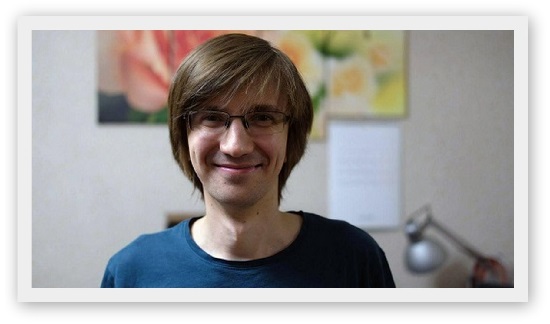
Tell me about yourself, how did you come to ABBYY?
I graduated from VMK MSU in 2011. In the fifth year of university, I worked for a few months at Luxoft in a rather exotic project. Our department has been developing software for mainframes. In the department, almost all employees were significantly older than me, which is very atypical for our industry as a whole. At the same time, the colleagues were very lively - the Beatles and Mike Naumenko played on corporate festivals. The student program in the project was quickly turned down and the youth was dismissed, retaining the backbone of the team. In December 2010, I updated my resume on Headhunter and invited me for an interview at ABBYY.
What projects are you working on now?
In 2011, I met in the dining room my colleague at the VMK Tolya Starostin. He then opened a new direction in ABBYY to extract information and looked for engineers to his team. So from the study group I got to him and still continue this project.
ABBYY's text analysis technology consists of two major components: a semantic-syntactic parser and a module for extracting information. Our group is working on extracting information . The semantic-syntactic parser builds parse trees for sentences, and our module extracts target information that customers want to get from the text. To do this, we try different approaches - from rules written by linguists to machine learning.
What is the hardest part of your job?
The most difficult thing in my work is to find a good balance between management and engineering tasks. Quite a lot of time is spent on setting tasks and helping colleagues, and often there is less time left to develop than we would like. In the morning I remotely parse mail, respond to emails, help colleagues. I usually come to the office closer to dinner. We have a free schedule, and it is very convenient.
You teach in parallel with the work. Why do you find this interesting?
The second year I teach MIPT students a course on Algorithms and C ++. My former colleague Stepa Matskevich drew me to teaching, and for me it was a strong move. It is interesting to work with students, teaching allows you to keep yourself in good shape.
What is important to you in ABBYY?
ABBYY has a lot of great people. I am interested in computer linguistics and the tasks that I do. When I settled in ABBYY, I was struck by the fact that the company organizes for employees not only corporate parties, but also excursions and master classes. I found a lot of interesting things - why are there only a foray with diggers along the bed of an underwater river, a hike through the Syanovsky quarries or to a brewery!
The guys during a hike in Syanovsky quarries, 2017. The picture is clickable.
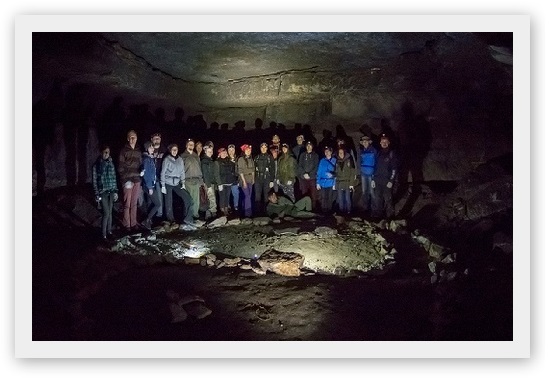
What do you do in your free time?
I am interested in education and enlightenment. With friends from the Center for Digital Humanitarian Studies of the Tower, we are doing the popular science project “The System Block ”, we are attaching humanities and people of creative specialties to technologies. We write about digital philology and history, quantitative analysis of culture, data-urbanistics, data visualization. Neural networks we write poems, and philologists criticize them!
Kostya Gudkov, developer in the Image Analysis Group
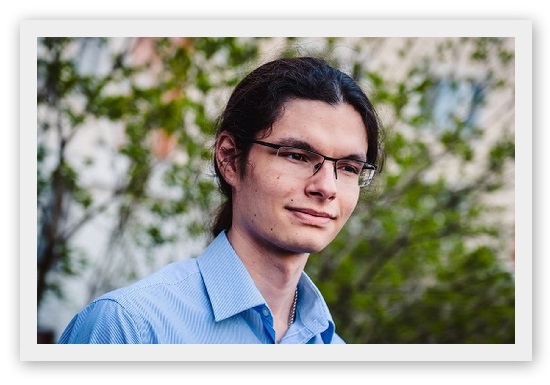
Tell me about yourself, how did you come to ABBYY?
I am a fifth-year student of the Moscow Institute of Physics and Technology , I study at the Faculty of Innovation and High Technologies (FIATT) in the magistracy at the Department of Image Recognition and Processing ( RIOT ). I came to Moscow from a small town in the Khanty-Mansiysk Autonomous Okrug, where I studied and participated in competitions in physics and programming. Thanks to them, I could enroll in any technical university without exams and eventually chose PhysTech, and in the second year I decided to go to the ABBYY department. Many of my fellow students also came here.
What are you working on?
With the help of a neural network I search text in different languages on images. For example, I have a photograph of a street in Korea, on which there are many signs, signs, signs, and numbers. The program can find the text on it and recognize it. Depending on the requirements, I wind up the neural network architecture.
I do other tasks. In most cases, the approach to their solution is not known in advance. How you decide them is your choice. I can do what I want if I agree with the authorities.
How is your workday?
I come to work at 10:30, have breakfast. At 11, get down to work. At 13:50 I have dinner. Then I sit down again for work, sometimes I go to meetings, take internal exams, play kicker, I conduct interviews. I have dinner at 18:50. Then I work until 10-11 pm and go home. I give work 10-12 hours a day, but I usually work 4 days a week, sometimes 3.
You do not only work, but also learn, right?
On Tuesdays and Thursdays, and therefore on these days of the week sometimes I do not come to work. I study at the School of Data Analysis in the specialty “Big Data” and in the magistracy at the RIOT department at Fiztekh. Last semester, I still led a couple at the Physics and Technology Institute. How do I do everything? Time management should be up to par =)) In the next semester I will again teach at the department - the subject “Algorithms and Data Structures”. I like to teach. True, a few people still got my retake.
Kostya assists in recruiting students for the ABBYY department at MIPT in 2017.

What is important to you in ABBYY?
There is a very good team here and a lot of my friends work. It so happened that there are a lot of students: we have our own company, and we communicate a lot. And here there is a great lesson bringing us together. Study is called) There are such tasks that regularly fall on you and from which you need to swim out. And doing it together is somehow easier. Solving them alone is harder. In addition, we have our own small projects.
What are your hobbies?
Sometimes I do origami. Read books. I love the classics, for example, Jack London, books for personal development, about the financial market, C ++, DL and machine learning. I like to solve programming problems.
In general, I read a lot. Going to the subway - read the article. I'm traveling by train - talking to someone or reading an article. I walk down the street - and either speak or listen to an audiobook. In general, my time is not wasted. But, by the way, I did not take time management courses =))
Valera Novitsky, Senior Developer, Knowledge Extraction and Semantic Analysis Group
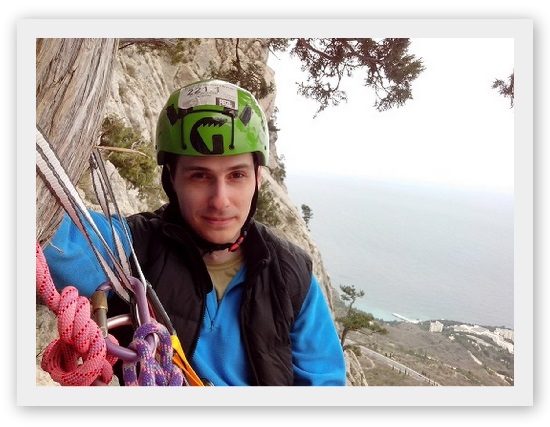
Tell me about yourself, how did you come to ABBYY?
I studied at the Physics and Technology Institute. First, at the Faculty of Management and Applied Mathematics ( FUPM , Bachelor), and then, when he went to the magistracy, he transferred to the ABBYY department at the Faculty of Innovation and High Technologies ( FIVT ). This was the first set for the new faculty and the new department. Actually, in 2006 I came immediately to the department and to work.
He worked in the group ABBYY Lingvo, participated in the release of version 12. Riveted features, rules, bugs, passed internal exams. It was interesting and fun. Part of the training was (and is now) right in the office, which is very convenient.
What are you working on right now?
Now I work in a department where technologies of syntactic-semantic analysis of texts in natural language and the extraction of knowledge from them are developed. I develop, for example, technologies for searching for named entities in texts. With this technology, for example, you can find references to people (which is not as simple as it seems at first glance), and then the data related to them (work, actions, etc.) are searched for.
We have a free schedule and have the opportunity to work remotely when there are no scheduled meetings, which I actively use. Usually I arrive at about 12, sort out the mail and, if something urgent does not appear, I solve problems from my plan. Code, debugging, support for the systems for which I am responsible, answers to colleagues' questions, a tea break with them, teaching, etc. - Shuffle in random order, do not shake =)
I also teach at the ABBYY department. Previously, he led the "Compiler Theory", now - a semester course on "Corpus linguistics". I also lead the scientific management of students on various tasks related to the processing of natural language.
What is important to you in ABBYY?
Cool team, interesting tasks, free schedule. ABBYY is a very atmospheric place thanks to the people who work here. Many - a very long time. March 8, in the preparation of which I myself often take part, and on February 23, as well as the New Year, are very soulful, largely due to the fact that they are made by the participants themselves.
“Summer with ABBYY” is a cool project. Now I almost do not participate in it, but I would like to. Just not enough time for everything.
“Summer with ABBYY” is a project that is already 10 years old. We at ABBYY are sure that summer is not only a time for vacations, but also an excellent opportunity to spend time with colleagues, get to know them better, and also acquire new skills, skills and knowledge. That is why every summer the company comes up with a rich program with excursions and master classes. Twice in the summer we conduct the rally ABBYY Road: a car trip to the beautiful and unusual places of the Moscow region and neighboring areas. Over the weekend, colleagues not only travel hundreds of kilometers in friendly company, but also walk a lot, go to museums, learn about the history of old estates, relax in nature and are inspired by travel. And during such trips, our employees can get to know each other better and make friends.
ABBYY team at the Church of the Sign in Dubrovitsy during ABBYY Road-2018. The picture is clickable.
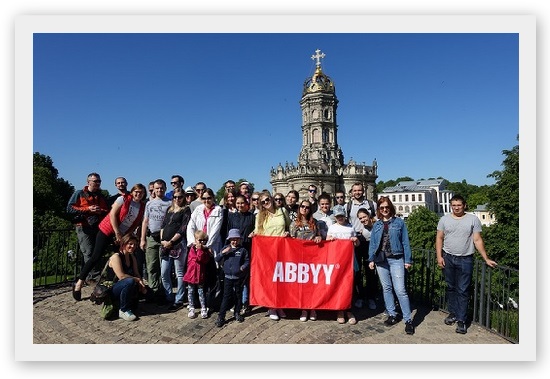
Tell me about your hobbies!
From sports: rock climbing, skiing, water trips. By the way, it all started thanks to my colleagues =) I ride a bike, traveling - from Kamchatka to Iceland. I like to read, meet friends and just keep active.
Nikita Orlov, Head of the Image Analysis Group
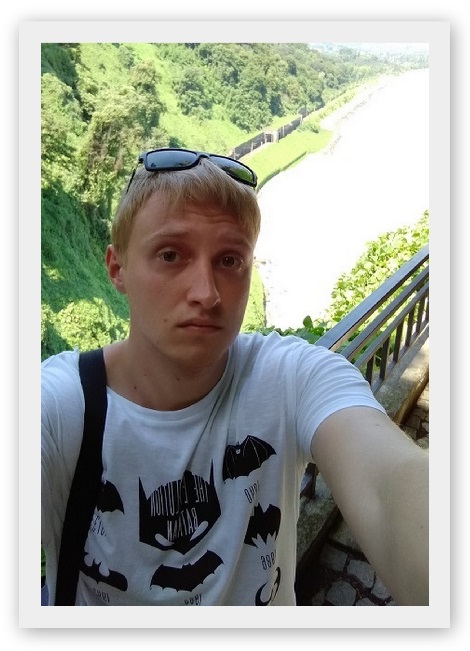
Tell me about yourself, how did you come to ABBYY?
He graduated from the Faculty of Innovation and High Technologies (FIVT) MIPT. Now I am studying in the first year at the Graduate School of Physics and Technology. On the 3rd course I entered the base department of ABBYY. When I finished the magistracy, I thought about where to go to study and work. As a result, I chose ABBYY: it is convenient to combine work and study here - all in the same building. On the 5th floor I programmed, solved working problems, and then went on pairs to the 7th floor. It's great that you do not need to spend an hour and a half on the way from work to study.
Now I work in a group that deals with analysis and image processing. Our task is to understand what the document is in front of us and prepare it for recognition.
I am attracted to everything related to data analysis, computer vision and machine learning. I was not imparted to love these spheres in ABBYY. Rather, I came to the company to develop in this area.
What tasks do you do?
Now I lead the Image Analysis Team. We search text on photos from the real world, classify documents, extract various information from them. At first glance, these tasks seem simple, what is so difficult: to distinguish a check from a business card, a passport from other documents? But there are tricks everywhere: for example, there are Russian passports, but there are foreign passports, and a client can ask us to process them all together at once, or divide them into two piles and classify them separately.
How is your workday?
I come to work in the morning, while there is no one in the office, I like to think and program in silence. In the afternoon, when most of the team is in the office, I discuss their tasks with the guys. I also teach at the department at MIPT. For example, in the morning I work in the office, and then I go to the 2nd floor to lead couples at the base department or go to the MIPT building at Timiryazevskaya. In our department, I conduct a course on programming under Windows with third-year students. At FIVT, I conduct seminars on algorithms for sophomores and seminars on image analysis for the 5th year. I like to teach: you develop together with students, keep yourself in good shape, transfer experience, learn to explain something new.
What do you like ABBYY?
I am very comfortable in our team. Bright, responsive people work for us, it is easy to find a common language with them. We have a strong team, and this undoubtedly attracts.
During the year many different events take place inside, in the preparation of which the employees themselves are actively involved, and this is cool. I don’t take part in many of them, as I’m very busy with work and it’s hard to switch to some events.
But there is one story that seems very interesting to me - puzzle collection. The company has a tradition - after the release of a product, colleagues buy and assemble a big puzzle. If you walk on the 5th floor and look at the walls, you can see a lot of different “pictures”. Now we have in the negotiation is a puzzle for 18 thousand parts, and anyone can come and pick it up.
The picture is clickable.
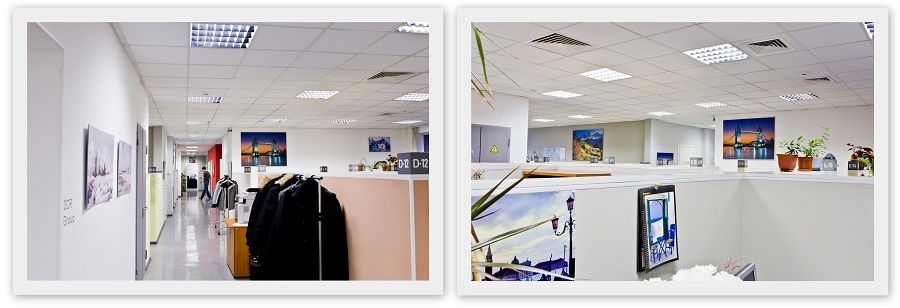
What do you do in your free time?
We walk with the guys around the city, go to quests, movies, play on the desk, sometimes travel. For example, during the 2018 World Cup, we went to different cities of our country with the guys to watch football there. We visited Sochi, Kazan, Nizhny Novgorod, St. Petersburg.
Sasha Subbotin, Senior Developer in the Cloud Technology Group
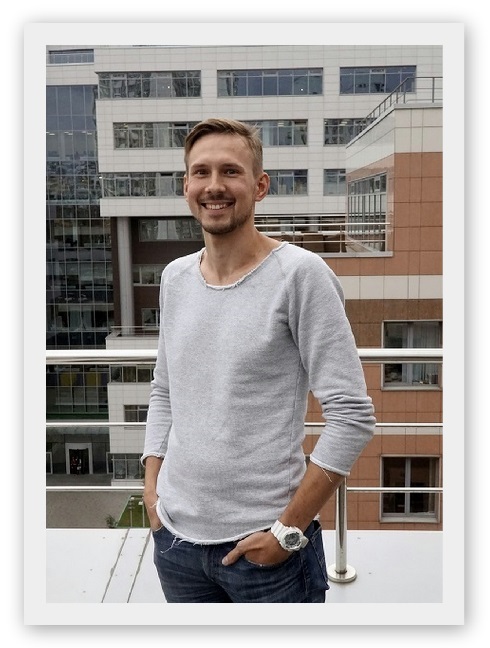
Tell me about yourself, how did you come to ABBYY?
I graduated from the Moscow Power Engineering Institute with a degree in Computing Machines, Complexes, Systems, and Networks.
If in Russia the professions of a scientist, physicist or astronomer allowed to earn money, then perhaps I would not have become a developer. After studying in the evening school at the faculty of aeromechanics and flying technology ( FALT ) of MIPT, my physics teacher was very upset that I did not choose science and physics as a result. On the other hand, I liked programming from the school where I wrote tic-tac-toe on an endless Pascal board.
In ABBYY came after the institute. Prior to that, he worked about a year as a project manager and managed projects for 1C. But I decided that I would no longer do 1C.
The list of good software companies in Moscow is limited to the fingers of two hands. ABBYY is a major software manufacturer, so I had no doubt that you can start and continue your career here. As a result, I have been working here for more than ten years.
What are you working at ABBYY?
I am developing web services, at the moment it is a cloud licensing.
And when I first came to ABBYY, I started by refactoring the little admin panel. After that, in the first few months of work, I developed an internal web service for redirecting links. Surprisingly, it turned out to be simple, useful, it still works in almost original form and is used in many departments of the company.
Another example of an interesting task: a year ago I had to quickly support a new product for me, while fulfilling managerial tasks: to communicate with customers from America. It was a driving experience: you are responsible not only for the code, but also for communication, and for the product. Feel a different level of responsibility and involvement.
I also teach .NET physics students. I recommend everyone to try their hand at teaching. It seems to be a simple truth: when you teach someone, you yourself understand the subject much better. And it works at 110%. I felt a second wind when I realized that I did not just understand the subject myself, but I know and can explain it at such a level that it would be clear to everyone.
How is your workday?
I usually come to work at 11-12 hours. When there are no urgent tasks and there is a typical development, I work for 8-9 hours a day. If a release is to come out and “everything burns”, I spend more time in the office. Fortunately, such situations are rare.
I consider the free work schedule a great blessing, especially for Moscow with its peak hours.
What do you like about working at ABBYY?
Free schedule and team. Both current and former employees of ABBYY always speak warmly about the friendly atmosphere in ABBYY. All people are pleasant, intelligent and responsive.
When I first joined the company, I actively participated in corporate events. ABBYY stands out among all IT companies, which usually do not celebrate all these holidays - March 8, February 23. We have a tradition when the founder of the company comes to the office on March 8, bakes pancakes and makes coffee for girls. It is very cute and, of course, sets a certain color.
As we celebrated this year on March 8 at the ABBYY office: David Yang treats the girls with his own brewed coffee.
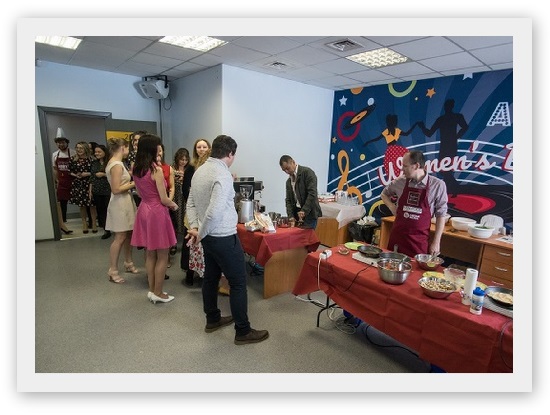
What are your hobbies?
For several years, he led a volleyball section at ABBYY, coached with his technicians and tactics. A couple of people are very well tightened during this time.
Want to create artificial intelligence with us? See what jobs are open in our R & D department. Ask any questions and join our team!
